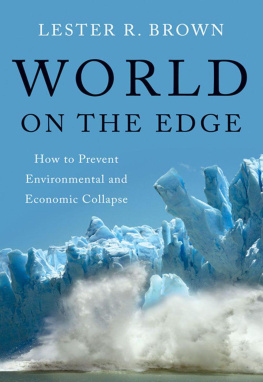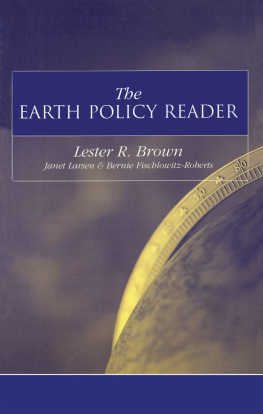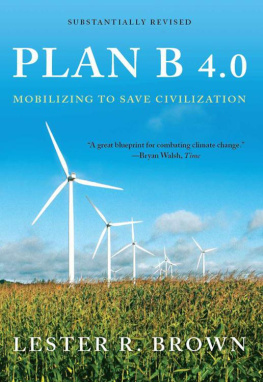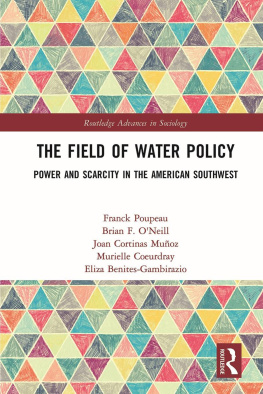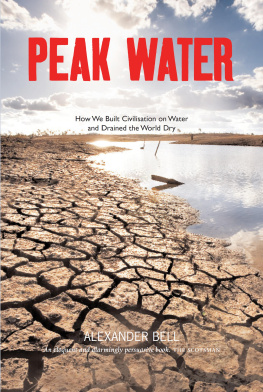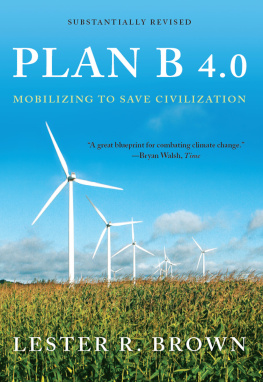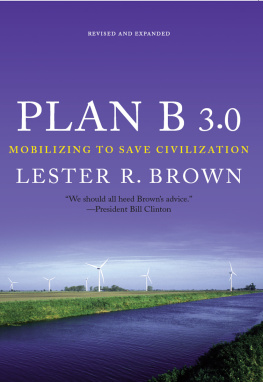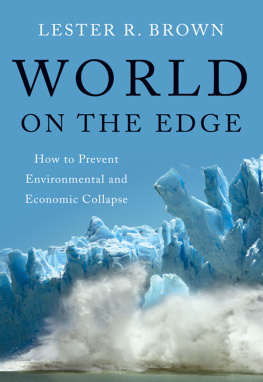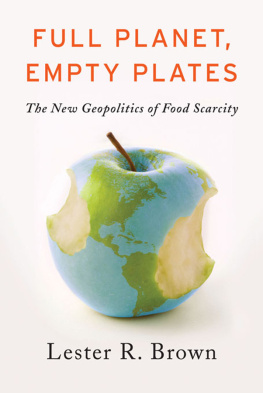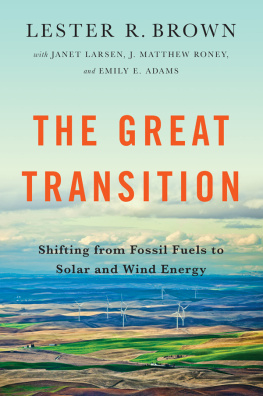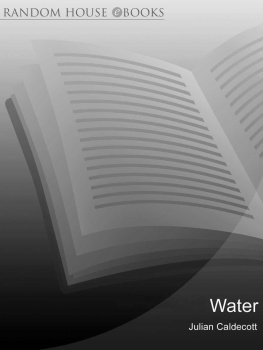Praise for Plan B
Lester Brown tells us how to build a more just world and save the planetin a practical, straightforward way. We should all heed his advice.
President Bill Clinton
a far-reaching thinker.
U.S. News & World Report
The best book on the environment Ive ever read.
Chris Swan, Financial Times
Its excitinga masterpiece!
Ted Turner
[Browns] ability to make a complicated subject accessible to the general reader is remarkable
Katherine Salant, Washington Post
In tackling a host of pressing issues in a single book, Plan B 2.0 makes for an eye-opening read.
Times Higher Education Supplement
A great blueprint for combating climate change.
Bryan Walsh, Time
"[Brown] lays out one of the most comprehensive set of solutions you can find in one place.
Joseph Romm, Climate Progress
a highly readable and authoritative account of the problems we face from global warming to shrinking water resources, fisheries, forests, etc. The picture is very frightening. But the book also provides a way forward.
Clare Short, British Member of Parliament
Lester R. Brown gives concise, but very informative, summaries of what he regards as the key issues facing civilization as a consequence of the stress we put on our environment.a valuable contribution to the ongoing debate.
The Ecologist
Brown is impassioned and convincing when talking about the worlds ills and what he considers the four great goals to restoring civilizations equilibrium
April Streeter, TreeHugger.com
In this impressively researched manifesto for change, Brown bluntly sets out the challenges and offers an achievable road map for solving the climate change crisis.
The Guardian
the best summation of humanitys converging ecological problems and the best roadmap to solving them, all in one compact package.
David Roberts, Grist
Lester R. Brownoffers an attractive 21st-century alternative to the unacceptable business-as-usual path that we have been following with regard to the environment (Plan A), which is leading us to economic decline and collapse.
Thomas F. Malone, American Scientist
Browns overall action plan is both comprehensive and compelling.
Caroline Lucas, Resurgence
Beautifully written and unimpeachably well-informed.
Ross Gelbspan, author of The Heat Is On
The best single volume on saving the earth, period.
Geoffrey Holland, author of The Hydrogen Age
World on the Edge
O THER N ORTON B OOKS
BY L ESTER R. B ROWN
Plan B 4.0: Mobilizing
to Save Civilization
Plan B 3.0: Mobilizing
to Save Civilization
Plan B 2.0: Rescuing a
Planet Under Stress and a
Civilization in Trouble
Outgrowing the Earth: The
Food Security Challenge in an
Age of Falling Water Tables
and Rising Temperatures
Plan B: Rescuing a Planet
under Stress and a
Civilization in Trouble
The Earth Policy Reader
with Janet Larsen and
Bernie Fischlowitz-Roberts
Eco-Economy: Building an
Economy for the Earth
State of the World 1984
through 2001
annual, with others
Vital Signs 1992 through 2001
annual, with others
Beyond Malthus
with Gary Gardner
and Brian Halweil
The World Watch Reader 1998
editor with Ed Ayres
Tough Choices
Who Will Feed China?
Full House
with Hal Kane
Saving the Planet
with Christopher Flavin
and Sandra Postel
Building a Sustainable Society
Running on Empty
with Colin Norman
and Christopher Flavin
The Twenty-Ninth Day
In the Human Interest
Earth Policy Institute is a nonprofit environmental research organization providing a plan for building a sustainable future. In addition to the Plan B series, the Institute issues four-page Plan B Updates that assess progress in implementing Plan B. All of these plus additional data and graphs can be downloaded at no charge from the EPI Web site.
Web site: www.earth-policy.org
WORLD ON THE EDGE
How to Prevent Environmental and Economic Collapse
Lester R. Brown
EARTH POLICY INSTITUTE
W W NORTON & COMPANY
NEW YORK LONDON
Copyright 2011 by Earth Policy Institute
All rights reserved
The E ARTH P OLICY I NSTITUTE trademark is registered in the U.S. Patent and Trademark Office.
The views expressed are those of the author and do not necessarily represent those of the Earth Policy Institute; of its directors, officers, or staff; or of any funders.
ISBN: 978-0-393-34096-9
W. W. Norton & Company, Inc., 500 Fifth Avenue,
New York, N.Y. 10110
www.wwnorton.com
W. W. Norton & Company, Ltd., Castle House, 75/76 Wells Street,
London W1T 3QT
Contents
Preface
When I meet old friends and they ask, How are you? I often reply, Im fine; its the world I am worried about. Arent we all is the common response. Most people have a rather vague sense of concern about the future, but some worry about specific threats such as climate change or population growth. Some are beyond questioning whether civilization will decline if we continue with business as usual, and instead they are asking when this will occur.
In early 2009, John Beddington, chief science advisor to the U.K. government, said the world was facing a perfect storm of food shortages, water scarcity, and costly oil by 2030. These developments, plus accelerating climate change and mass migration across national borders, would lead to major upheavals.
A week later, Jonathon Porritt, former chair of the U.K. Sustainable Development Commission, wrote in the Guardian that he agreed with Beddingtons analysis but that the timing was off. He thinks the crisis will hit much closer to 2020 than 2030. He calls it the ultimate recessionone from which there may be no recovery.
These assessments by Beddington and Porritt raise two key questions. If we continue with business as usual, how much time do we have left before our global civilization unravels? And how do we save civilization?
World on the Edge is a response to these questions. As to how much time we have left with business as usual, no one knows for sure. We are handicapped by the difficulty of grasping the dynamics of exponential growth in a finite environmentnamely, the earth. For me, thinking about this is aided by a riddle the French use to teach schoolchildren exponential growth. A lily pond has one leaf in it the first day, two the second day, four the third, and the number of leaves continues to double each day. If the pond fills on the thirtieth day, when is it half full? The twenty-ninth day. Unfortunately for our overcrowded planet, we may now be beyond the thirtieth day.
My sense is that the perfect storm or the ultimate recession could come at any time. It will likely be triggered by an unprecedented harvest shortfall, one caused by a combination of crop-withering heat waves and emerging water shortages as aquifers are depleted. Such a grain shortfall could drive food prices off the top of the chart, leading exporting countries to restrict or ban exportsas several countries did when prices rose in 200708 and as Russia did again in response to the heat wave of 2010. This in turn would undermine confidence in the market economy as a reliable source of grain. And in a world where each country would be narrowly focused on meeting its own needs, the confidence that is the foundation of the international economic and financial systems would begin to erode.
Now to the second question. What will it take to reverse the many environmental trends that are undermining the world economy? Restructuring the economy in time to avoid decline will take a massive mobilization at wartime speed. Here at the Earth Policy Institute and in this book, we call this massive restructuring Plan B. We are convinced that it, or something very similar to it, is our only hope.

